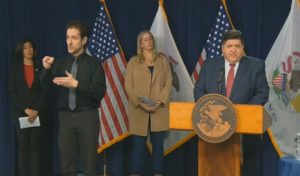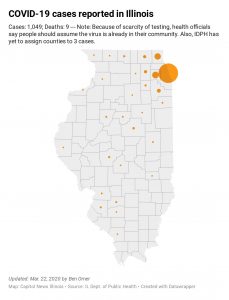Governor calls for volunteers as coronavirus cases see largest single-day spike
By Jerry Nowicki Capitol News Illinois — March 23, 2020
Gov. J.B. Pritzker addresses the media during his daily COVID-19 briefing Sunday in Chicago. (Credit: blueroomstream.com)
SPRINGFIELD – As the state saw the largest single-day jump in confirmed COVID-19 cases and an infant tested positive for the virus, Gov. J.B. Pritzker on Sunday, March 22 called for volunteerism from healthy Illinoisans and increased blood donations.
State health officials announced 296 new confirmed cases, bringing the total to 1,049, and three new deaths, bringing the total to nine. A total of 8,374 people have been tested in the state, according to coronavirus.illinois.gov, which has a database of information related to the virus and the state’s response. The number of affected individuals range from the infant to age 99.
Dr. Ngozi Ezike, director of the Illinois Department of Public Health, said experts are still learning about this new, novel virus, and “information and guidance is rapidly evolving.”
“At this time, it is still unknown if a pregnant woman with COVID-19 can pass the virus to her fetus during pregnancy or delivery,” Ezike said at a daily COVID-19 briefing in Chicago. “According to the (U.S. Centers for Disease Control and Prevention), no infants born thus far to mothers with COVID-19 have tested positive for the virus. In these cases, which of course are still a few in number, the virus was not found in samples of amniotic fluid, nor breast milk.”
Ezike said experts still need more information on the virus and a recent increase in testing is helping to provide it as the state works with hospitals to increase the number of people tested. She also said the number of cases and deaths will continue to increase in the near future.
The three new deaths are a Cook County man in his 80s, a Chicago man in his 80s and a McLean County woman in her 70s.
The virus has now been confirmed in at least 30 of the state’s 102 counties, as Jo Daviess, Livingston, Rock Island and Stephenson counties are now reporting cases. Experts, however, have urged that Illinoisans should act like the virus is already in their communities as lack of testing means it has probably spread far beyond the reported cases.
As the state reported the biggest single-day spike in confirmed cases, the governor directed potential volunteers to serve.illinois.gov, where those looking to help will be matched with service organizations that are in need of volunteers.
“This is an opportunity for healthy college students looking for something to do, or individuals who aren’t able to work from home, an opportunity for people who are healthy and looking to help,” Pritzker said at the briefing.
He said the Serve Illinois Commission is providing CDC guidance to service organizations across the state. This includes daily health surveys and temperature checks for volunteers and staff, disinfecting surfaces at shift changes, and limiting volunteer groups to no more than 10 people at a time, all with proper social distancing parameters.
He also called for blood donations as blood drives across the state are canceled, and noted there is no evidence that respiratory illnesses such as COVID-19 can be spread through the blood stream. He also emphasized that donating blood does not weaken one’s immune system.
“A blood shortage would only worsen the healthcare crisis that we’re facing right now. So we need your help,” he said.
He also called for donations of personal protective equipment, or PPE. His administration can be contacted on the matter via email at PPE.donations@illinois.gov.
Jenné Myers, CEO of the Chicago Cares charity, said there is still a great need for volunteerism.
“We build community, we share resources, we strive to build a more vibrant and equitable Illinois,” she said of volunteers and volunteer organizations. “And for many of us, the COVID-19 pandemic is challenging this call to action. I’m here to tell you, though, that there’s still a great need for volunteers throughout the state to help our most vulnerable neighbors.”
She said potential volunteers should reach out to neighborhood organizations or the Serve Illinois website, and she noted food pantries, shelters and related organizations need volunteers. She also urged people to check on neighbors and go shopping for those who cannot leave the house.
Celena Roldán, CEO of the American Red Cross of Illinois, said “every two seconds, someone in the United States needs blood.”
“To date, more than 6,000 Red Cross blood drives have been canceled across the country, resulting in 200,000 fewer blood donations,” she said, adding that 120 of those cancellations came in Illinois after the COVID-19 crisis started.
“One of the most important things that you can do to ensure that we do not have another health crisis is to give blood,” she said.
Appointments for giving blood can be made by calling 1-800-red-cross or by making an appointment at redcrossblood.org.
Pritzker also addressed concerns over his Saturday call for retired health care professionals to rejoin the field. He said older retirees would be kept away from COVID-19 patients and would likely deal with patients in need of other care. Hospitals would make an effort to separate those with COVID-19 from the regular population, he said.
“For those who are older we certainly want people to take extra care we wouldn’t want anybody who deems themselves to be at risk or falls into a high-risk category to come into the healthcare profession and be exposed to COVID-19,” he said.
He said the call is also for people who have recently left the healthcare field for other jobs to come back to the field.
“You may have gone into business or decided that you want to stay home and take care of a family, and you may now deem yourself available to serve, do some hours as a healthcare professional, so we invite you please to volunteer yourselves to come back in and help us out during this time of great need,” he said.
For health questions about COVID-19, call the hotline at 1-800-889-3931 or email dph.sick@illinois.gov.
jnowicki@capitolnewsillinois.com
Pritzker’s call for greater federal COVID-19 help sparks Trump Twitter spat








